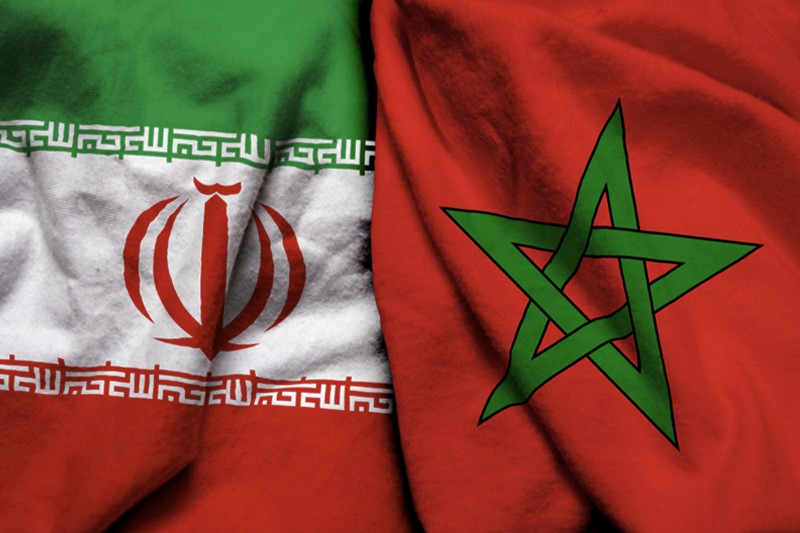The announcement made by Tehran regarding its initiative to normalize relations with Morocco, as stated by its Foreign Minister, Amir Abdollahian, marks a significant and unexpected shift in Iran’s foreign policy towards Morocco. It seems that this change in Iran’s stance is primarily influenced by the geopolitical transformations occurring in the region. This development comes in the midst of strained relations between Israel and Iran since the Netanyahu government came into power, particularly due to Israel’s settlement policy in Palestinian territories. Consequently, the second Negev summit has been postponed and has yet to take place. Iran sees an opportunity to leverage this situation by forging closer ties with Morocco in order to counterbalance Israel’s influence. Additionally, Tehran is benefiting from the recent rapprochement and normalization with the Kingdom of Saudi Arabia, facilitated by Chinese sponsorship. This move allows Iran to invest in Saudi Arabia’s role in fostering closer relations with certain Arab countries, including Morocco.
On June 30th of the previous year, Hussein Amir Abdollahian, the Iranian Foreign Minister, made a surprising announcement expressing Iran’s intention to normalize relations with the Kingdom of Morocco. This development raises questions about the motives behind Iran’s sudden interest and the potential challenges that may arise in reestablishing relations between the two countries.
Multiple Motivations
There are multiple motivations behind the announcement of the Iranian Foreign Minister expressing his country’s desire to restore relations with Morocco at this time, and the most important of these are:
- There is an increasing consensus among countries in the Middle East region regarding the significance of pursuing de-escalation as a viable option. After years of armed conflicts in Syria, Yemen, and Iraq, which have caused widespread devastation and led to the displacement of numerous refugees and migrants, it has become evident that containing tensions and conflicts is essential for achieving stability in the area. As a result, the prospect of normalization between Arab countries and Iran has emerged as an alternative to continued confrontation and competition. This approach is expected to redirect these conflicts towards a path of de-escalation and negotiation, aiming to find solutions for the long-standing disputes in the region.
- The impact of the strained relations between Israel and Arab countries can be observed through the postponement of the second Negev Summit. This gathering, which was set to include Arab nations that have previously signed peace agreements with Israel, has been delayed due to the escalating tensions caused by Israeli attacks and the settlement policy pursued by the Netanyahu government. Notably, Israeli Prime Minister Benjamin Netanyahu’s recent statements made on June 26th, during a closed session of the Foreign Affairs and Security Committee of the Knesset, further added to the discord. In these remarks, he expressed the necessity of dismantling the notion of establishing a Palestinian state and undermining the aspirations of Palestinians for an independent nation. Moreover, Netanyahu emphasized Israel’s preparations for the post-Mahmoud Abbas era, as the Palestinian leader is currently facing a health crisis. Against this backdrop, it appears that Tehran is seizing the opportunity to engage with Morocco, thereby countering Israel’s growing influence in the Arab Maghreb region.
- Exploiting the consequences of the Beijing Agreement between Riyadh and Tehran, which resulted in the restoration of Saudi-Iranian relations through Chinese mediation, indicates a new political approach from Saudi Arabia. This development could potentially facilitate the revival of Moroccan-Iranian relations. Additionally, Tehran considers reestablishing relations with Morocco and Egypt as diplomatic priorities. On the other hand, the Kingdom of Saudi Arabia believes that containing tensions between Arab countries and Iran can create a favorable environment for engaging with Tehran. This, in turn, could pave the way for a new round of negotiations aimed at resolving armed conflicts in Yemen and Syria and achieving regional stability.
Different Challenges
Despite the political motives behind Iran’s announcement of its desire to normalize relations with Morocco, the Iranian initiative faces several challenges, including:
- Iran’s stance on the Western Sahara issue, particularly highlighted by its representative to the United Nations last June, reaffirms its support for the Polisario Front’s agenda, backed by Algeria. Reports favoring the Polisario have confirmed that Iran’s representative reiterated Tehran’s position on the “Polisario agenda” during the UN’s Special Political and Decolonization Committee (Fourth Committee). Iran expressed its support for the ongoing negotiation process and emphasized the critical importance of achieving a fair, permanent, comprehensive, and acceptable political solution based on the principles of the United Nations Charter. Previous international reports have exposed Iran’s training of Polisario fighters and the provision of weapons, with Algeria’s approval. In contrast, Morocco insists that Iran must distance itself from supporting the Polisario, which operates under Algerian control. This divergence in Iran’s position on the Polisario poses a significant challenge to the resumption of relations between the two countries.
- Tehran has adopted a balanced policy in its relations with Morocco and Algeria, two countries that are regional competitors. Iran strategically benefits from the competition and political conflicts between Morocco and Algeria to bolster its military sales to Algeria, particularly in the realm of drone sales. International monitoring reports have confirmed Iran’s recent efforts to expand its influence into new territories, including the coastal region and Greater Morocco. By establishing a foothold in this strategically important area adjacent to vital shipping lanes in the Atlantic Ocean, Iran has sought to strengthen its ties with Algeria. These relations were further solidified when Iran supplied drones to the Polisario Front via Algeria during tensions between Rabat and Algiers, as highlighted by Morocco’s Permanent Representative to the United Nations, Omar Hilale, on multiple occasions. Consequently, any normalization between Iran and Morocco is expected to raise concerns in Algeria, which may interpret it as a potential shift in stance on the Western Sahara issue or even alignment with Morocco on contentious issues and files.
- Tehran is increasingly concerned about the growing US-Moroccan relations due to the pressures exerted by the US-Moroccan alliance. Morocco holds a significant position as a key ally of the United States in the region. This is evident in the US’s active support for Morocco’s military capabilities, including the provision of advanced weaponry to ensure its military superiority. Particularly noteworthy is the US Pentagon’s announcement in April of last year regarding the sale of HIMARS missile systems to Morocco. These sophisticated and high-quality weapons have the potential to shift the regional balance of power. Morocco became the first African country to acquire HIMARS rocket launchers, following the approval of the deal by the US Department of State, with a budget of up to $524 million. Consequently, the political coordination between the United States and Morocco on international matters, such as the Iranian nuclear program, presents an additional challenge that obstructs the normalization between Iran and Morocco. Iran may seek to leverage its position on the Western Sahara issue to negotiate Morocco’s support for Iran’s stance on its nuclear program.
Possible Scenario
Despite the challenges involved, the restoration of relations between Morocco and Iran appears to be within reach. The return of these relations could be anticipated, particularly if Tehran adopts a balanced stance regarding the Western Sahara issue, enabling it to maintain a diplomatic equilibrium between Morocco and Algeria. Simultaneously, Morocco could view the reestablishment of its ties with Iran as an advantageous leverage point in negotiations with Israel, particularly regarding Israeli policies in the Palestinian territories. However, it is improbable that a political agreement would be reached between the two parties that guarantees Tehran’s recognition of Morocco’s position in exchange for Moroccan support of Iran’s nuclear program.


